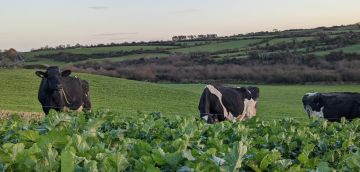Livestock Management in Organic and Biological Agriculture

The module will focus on the importance of integrated systems of livestock management for regenerative agricultural production. Animal nutrition requirements will be appraised with a focus on maintaining condition and health of livestock for optimum output. Pasture production systems including set-stocking, rotational grazing, mob-grazing, and holistic planned grazing will be compared and contrasted. Integrated pest management approaches to prevent and manage common livestock pests and diseases and the challenge of anti-microbial resistance will be an important aspect in the material covered.
- Organic and biological livestock production systems, climate impact, resilience, and human protein needs
- Rumen nutrition for balanced dietary intake and optimal meat and milk production
- Monogastric pig and poultry nutrition and dietary requirements for optimal field performance and production
- Dealing with livestock management transition challenges in organic and biological production systems
- Pasture and forage production and management systems to reduce external inputs and associated costs
- Integrated pest management and low-stress handling to maintain animal health and welfare
- One welfare initiative and sustainable anti-microbial management and use
- Policy and regulation related to organic livestock production in the F2F Strategy, the CAP, and the Programme for Climate Action
The module will be delivered during the second semester of each academic year with online lecture and tutorial sessions each week. Course days will be held during the semester for visits to farms where low-stress livestock handling, low input production, and diverse forage management is being practiced. Field practicals will be held in SETU Waterford West Campus in Carriganore and in different locations around the country. Case study assessments and farm audits will be held during the semester at spaced intervals and the final written exam will be held at the end of the semester.
On successful completion of this module, a student will be able to:
- Demonstrate a detailed knowledge of organic and biological principles for livestock management.
- Explain and illustrate the impact of poor nutrition on animal performance for sustainable meat and milk production
- Apply nutritional needs and requirements to formulate dietary ingredients for the different livestock categories and groups.
- Compare, contrast and discriminate between different pasture and forage management systems for livestock production.
- Review different IPM methods and practices to design and develop appropriate treatments for livestock diseases and pests.
- Judge the importance of, and critically assess and evaluate, the sustainability of anti-microbial use in livestock production.
- Appraise and justify the impact of livestock production systems on biodiversity, climate, environment, and water quality based on contemporary knowledge and research findings.
Graduates with the Level 9 Certificate in Livestock Management in Organic and Biological Agriculture may wish to apply the knowledge and practices learned in primary commercial production, provide support and technical advice to growers and farmers or may opt to remain in a research, development and innovation environment. They may also use their applied knowledge and skills in public service for the development of supportive agricultural, climate, and environmental policy.
Upon successful completion of other Level 9 Certificates the learner can graduate with a Certificate in Organic and Biological Production (30 credits), a Postgraduate Diploma in Organic and Biological Agriculture (60 credits), plus a dissertation for a MSc in Organic and Biological Agriculture (90 credits).

